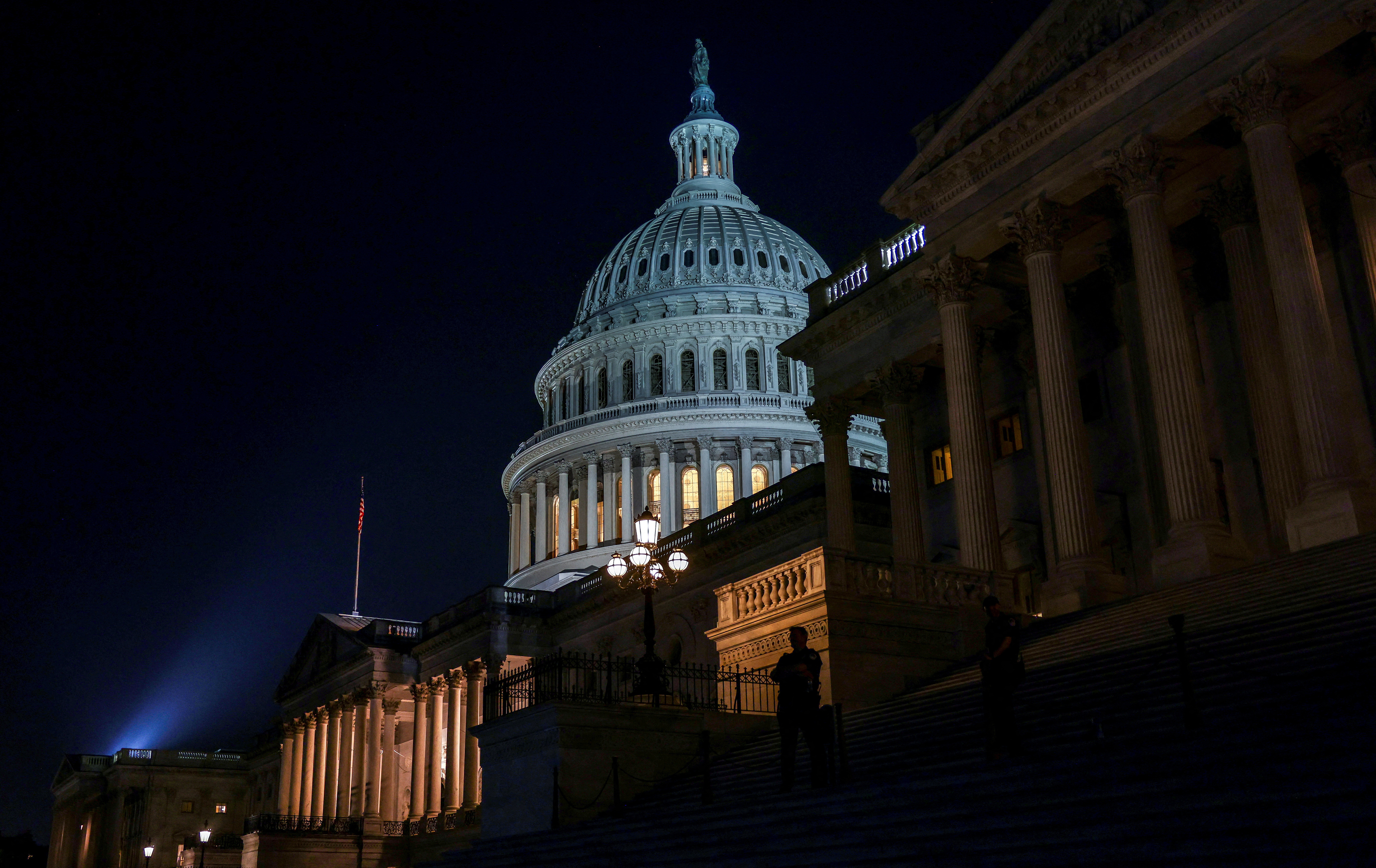In a surprising move, the US Government’s credit rating has been downgraded to AA+ from AAA by Fitch, one of the world’s leading credit rating agencies. This decision has sparked a mix of reactions among financial analysts, government officials, and investors worldwide.

U.S. Capitol police stand outside the Capitol building as the Senate votes on debt ceiling legislation to avoid a historic default at the U.S. Capitol in Washington, U.S., June 1, 2023. REUTERS/Evelyn Hockstein/File Photo
Stock futures in the United States experienced a drop following the decision by Fitch Ratings to downgrade the country’s long-term rating.
This move has triggered a sell-off as traders scrutinize the latest quarterly results. Notable happenings in the market include an 8% drop in Qualcomm shares due to missed revenue expectations, and a 3.6% rise in DoorDash shares after surpassing expectations. The tech sector was hit hard, with the Nasdaq Composite experiencing its worst day since February due to rising bond yields. The downgrade by Fitch Ratings was attributed to expected fiscal deterioration and weakening governance[1]. This downgrade has raised concerns about the US’s ability to pay back its debts, threatening the position of the US dollar as the most widely held currency[2]. The market responded with a weaker opening the next day and global markets stumbling overnight[2]. This situation is reminiscent of the 2011 downgrade by Standard and Poor’s, which led to a significant drop in the S&P 500 and volatile market conditions[2]. Despite this, the US stock market performance has been relatively good, with the S&P 500 closing last month with a boost of about 21% for the year[2].
References: [1] Stock market today: Live updates [2] The last time US debt was downgraded markets … [3] Markets slump after U.S. rating downgrade, hot jobs data ( …
The Downgrade and Its Implications
According to Fitch, the downgrade is due to concerns over the country’s fiscal health and a growing government debt burden. This decision comes despite the government’s recent success in raising the debt ceiling to $31.4 trillion, which was seen as a potential safeguard against defaulting on its debts.
This downgrade puts the US one notch below the highest rating, potentially impacting its reputation as a secure investment. In response, Treasury Secretary Janet Yellen has described Fitch’s move as “arbitrary”, arguing that it relied on “outdated data” from the 2018 to 2020 period.
Market Reaction to the Downgrade
The announcement led to a safe-haven push in the market, with investors moving out of stocks and into government bonds and the dollar. However, some financial analysts believe that the downgrade will have a minimal long-term impact on the market. For instance, Alec Phillips, Chief US Political Economist at Goldman Sachs, stated that the downgrade mainly reflects governance and medium-term fiscal challenges, but does not reflect new fiscal information.
The Questioning of the Downgrade’s Timing
The timing and rationale behind the downgrade have taken many economists by surprise. Former US Treasury Secretary Larry Summers described Fitch’s decision as “bizarre and inept,” especially considering the current strength of the US economy. Similarly, Jason Furman, an economic adviser to former US president Barack Obama, called the timing of the announcement “completely absurd.”
Fitch’s Stand on Governance
Fitch justified the downgrade by citing a “steady deterioration” in governance over the last two decades. This includes fiscal and debt issues, despite the recent bipartisan agreement to suspend the debt limit until January 2025.
The White House’s Response
The White House echoed Yellen’s sentiments, expressing strong disagreement with Fitch’s decision. White House Press Secretary Karine Jean-Pierre said, “It defies reality to downgrade the United States at a moment when President Biden has delivered the strongest recovery of any major economy in the world.”
The Impact on the US’s Reputation
The downgrade is seen as a dent to the US’s reputation, with analysts pointing out that it demonstrates the harm caused by repeated rounds of contentious debate over the debt ceiling. Steven Ricchiuto, US Chief Economist at Mizuho Securities USA, said, “This basically tells you the U.S. government’s spending is a problem.”
Surprise Among Analysts
Despite Fitch having previously flagged the possibility of a downgrade, the timing of the announcement has surprised analysts. Wendy Edelberg, Director of The Hamilton Project At The Brookings Institution, questioned how Fitch could have worse information now than before the debt ceiling crisis was resolved.
Investors’ Response
Investors use credit ratings to assess the risk profile of companies and governments when they raise financing in debt capital markets. Generally, the lower a borrower’s rating, the higher its financing costs. However, Jason Ware, Chief Investment Officer at Albion Financial Group, believes that the downgrade is unlikely to deter long-term investors from investing in US stocks.
The Possibility of a Mild Recession
Fitch also mentioned that it expects the US to slip into a mild recession later this year. However, Nobel Laureate economist Paul Krugman argued that the most significant economic news over the past year has been America’s success at reducing inflation without causing a recession.
The Road Ahead
While the downgrade has sparked controversy and debate, most analysts believe it will have a limited impact on the US economy and markets. As the US government continues to navigate its fiscal challenges, all eyes will be on how these developments shape the country’s economic trajectory in the coming years.


